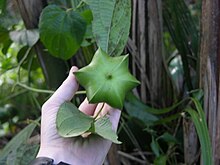| Plukenetia volubilis | |
|---|---|

| |
| Fruit of Plukenetia volubilis, Ecuador | |
| Scientific classification | |
| Kingdom: | Plantae |
| Clade: | Tracheophytes |
| Clade: | Angiosperms |
| Clade: | Eudicots |
| Clade: | Rosids |
| Order: | Malpighiales |
| Family: | Euphorbiaceae |
| Genus: | Plukenetia |
| Species: | P. volubilis
|
| Binomial name | |
| Plukenetia volubilis | |
| Synonyms[1] | |
| |

Plukenetia volubilis, commonly known as sacha inchi, sacha peanut, mountain peanut, Inca nut or Inca-peanut, is a perennial plant in the family Euphorbiaceae, having small trichomes on its leaves. It is native to much of tropical South America (Suriname, Venezuela, Bolivia, Colombia, Ecuador, Peru, and northwestern Brazil), as well as some of the Windward Islands in the Caribbean.[2] It is cultivated commercially in South East Asia, most notably in Thailand. Although its raw seeds and leaves contain toxins, these components are safe for consumption after roasting.[3]
Plukenetia volubilis should not be confused with Caryodendron orinocense, which is commonly known as inchi, cacay, or orinoconut.
- ^ The Plant List: A Working List of All Plant Species, retrieved 22 April 2017
- ^ Kew World Checklist of Selected Plant Families
- ^ Srichamnong, W; Ting, P; Pitchakarn, P; Nuchuchua, O; Temviriyanukul, P (2018). "Safety assessment of Plukenetia volubilis (Inca peanut) seeds, leaves, and their products". Food Science & Nutrition. 6 (4): 962–969. doi:10.1002/fsn3.633. PMC 6021735. PMID 29983959.